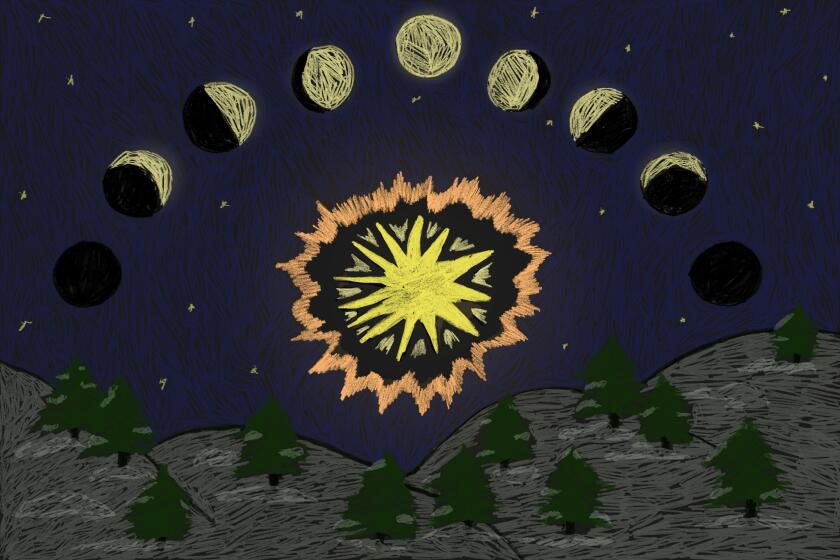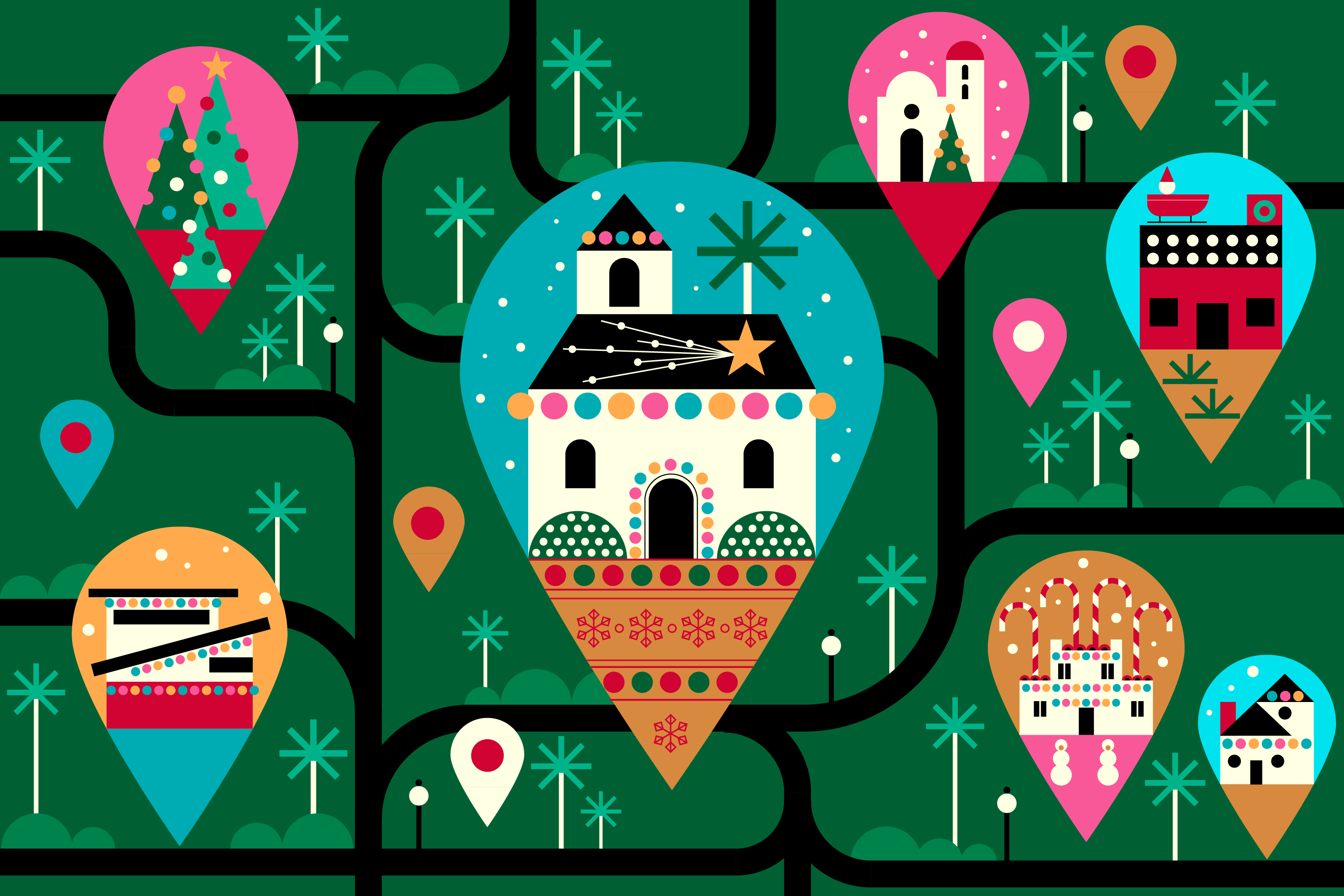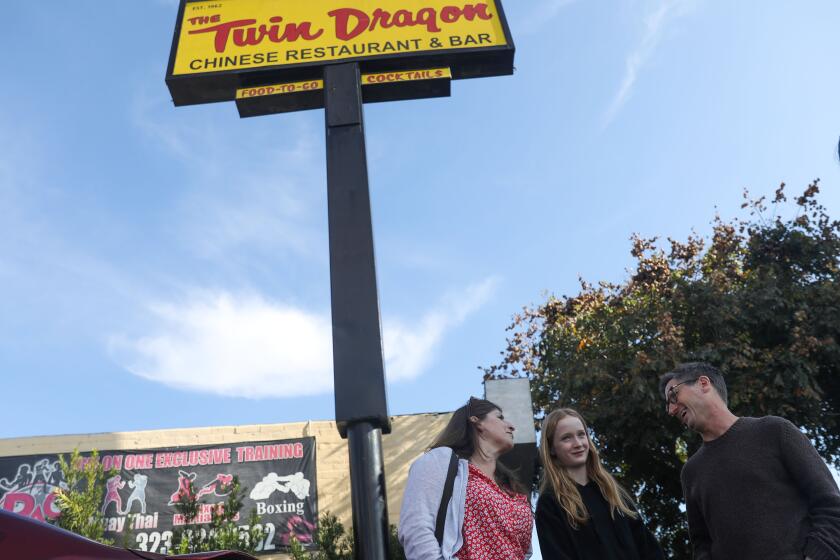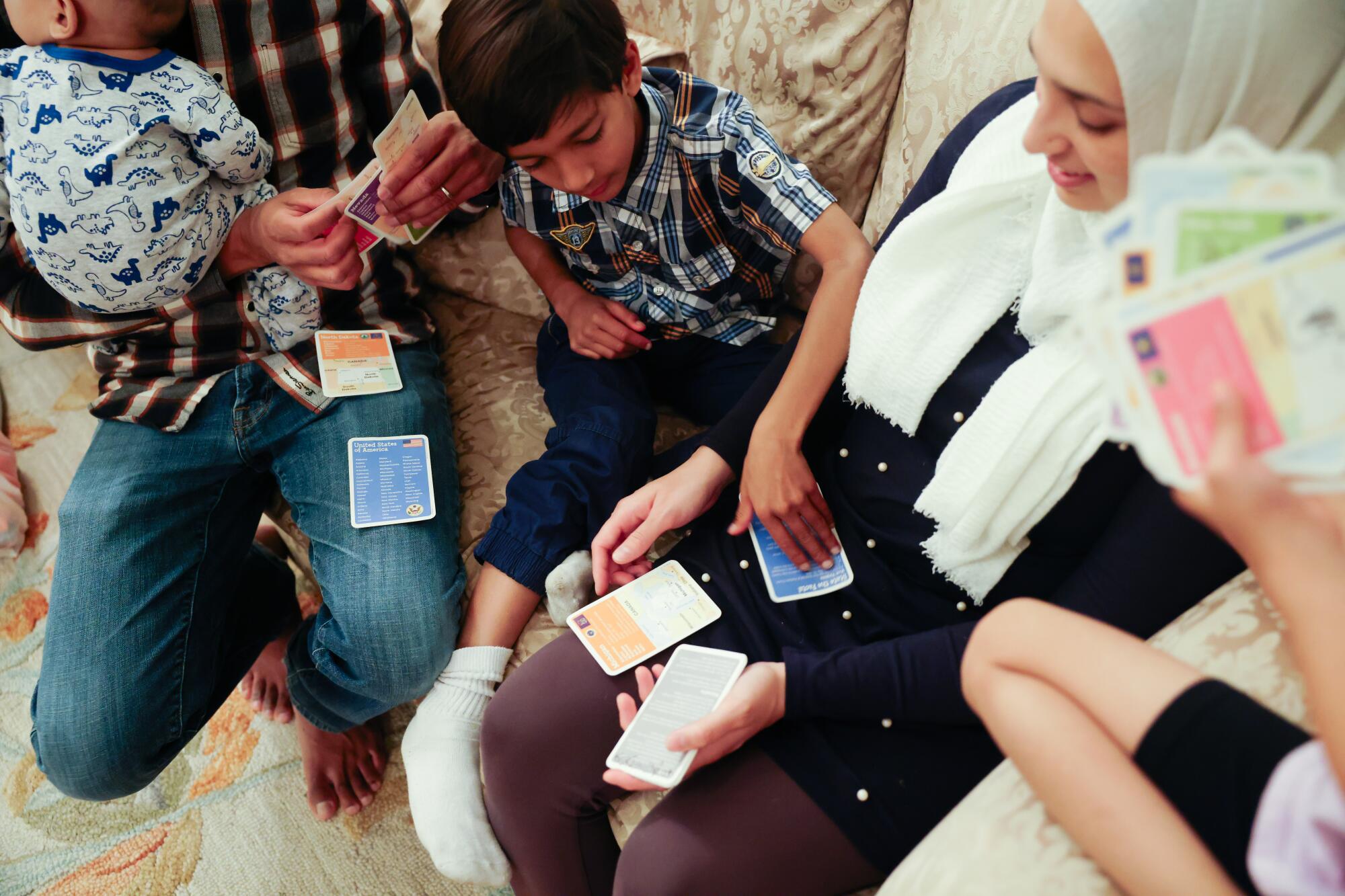
If you are among the millions of people in Southern California celebrating Christmas this year, let me say that I truly love your holiday. The colorful lights strung across your yards bring me joy each winter. I love your festive foods — tamales, roasts and all those cookies — and I’ve been singing along to Christmas music in the car for nearly a month now.
But as a Jewish person, I will always think of Christmas as your holiday, not mine. Nothing looks cozier than a Christmas tree glowing in a darkened living room, but I’m not going to put one up, hang lights around my house or put a wreath on my door. Instead, my family already observed our winter holiday — lighting the menorah and frying latkes in an ungodly amount of oil.
Still, not celebrating Christmas is hard when it persistently permeates the culture — and that’s especially true for kids. When my son was in elementary school, he was very blue on Christmas. “It’s not fair,” I remember him saying. “Everyone else gets to celebrate except us.”
But, of course, it’s not “just us.” Here in Los Angeles, we are blessed to live in the most religiously diverse city in the world, where Jewish families like mine are joined by Muslims, Bahais, Hindus, Jehovah’s Witnesses and others who either don’t celebrate Christmas at all or who have devised their own ways of honoring what some have come to see as a secular or American holiday. (Many Buddhists celebrate Christmas without the Jesus part.)
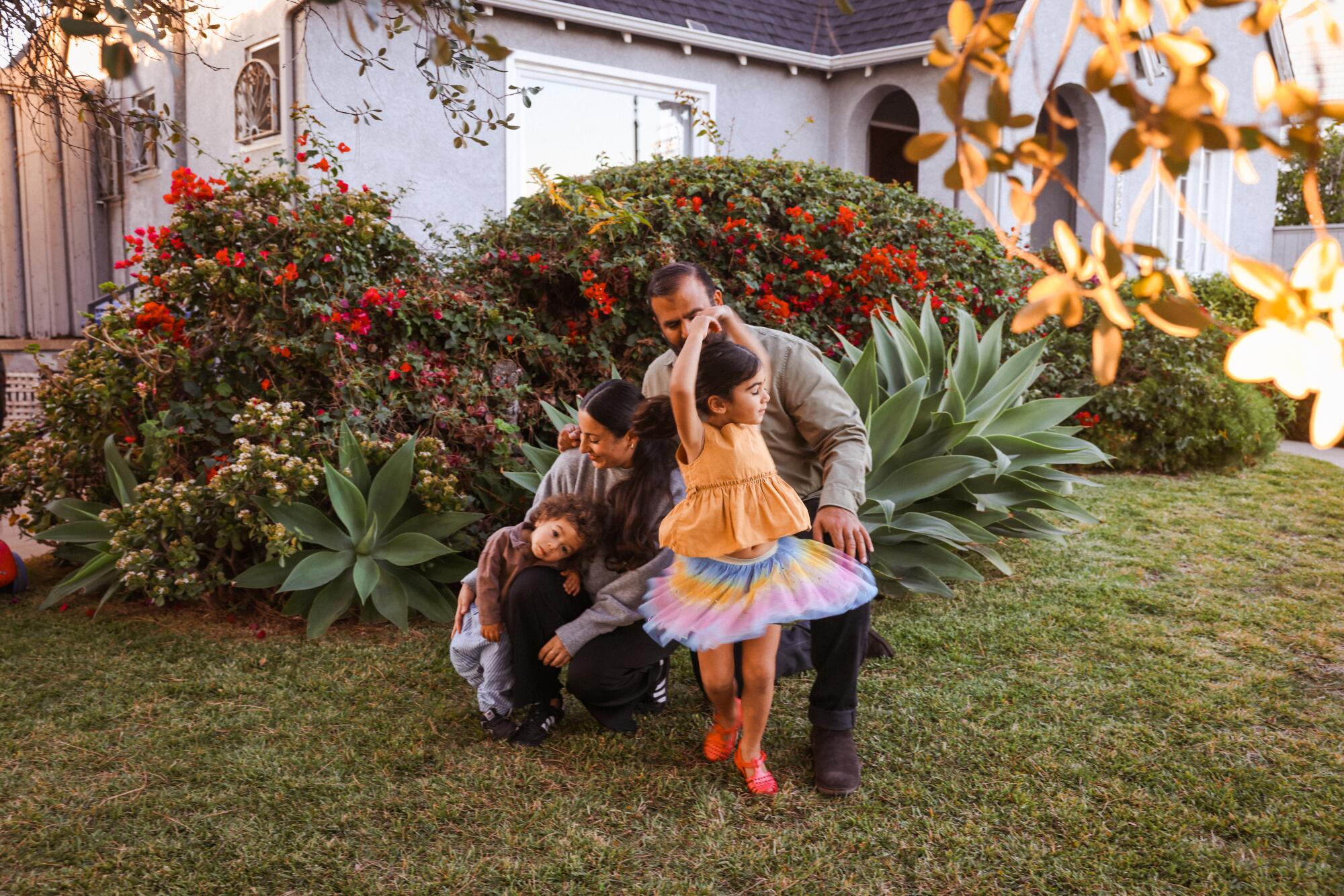
Once again we have entered the time of the winter solstice — when daylight is scarce and the creeping darkness seems to whisper: Slow down.
Over the years, my family has developed our own rituals on Dec. 25 — many of them established to chase my son’s melancholy away. In the morning, we watch a YouTube playlist of some of our favorite holiday sketches from “Saturday Night Live,” including Robert Smigel’s claymation classic “Christmastime for the Jews” and Adam Sandler’s first performance of “The Hanukkah Song.” (He looks so young.) We usually go on a hike (nature is always open), and if we can’t score an invite to someone’s Christmas dinner, we’ll make our own feast while listening to what my husband calls “acceptable Christmas music.’’ (“Up on the House Top” by the Jackson 5 tops his list.)
Over the last month, I interviewed five families from different faith backgrounds about their experiences not celebrating traditional Christmas. Some felt proud of being outside the mainstream at this time of year; others admitted yearning, especially when they were younger, to celebrate a holiday that centered kids so fully. But most agree that Christmas — with its values of love, peace, family and the joy of giving and receiving gifts — is pretty beautiful. And some talked about holidays with similar themes in their own traditions.
I also found something else in every home I visited: The shared experience of not sharing an experience.
It’s OK to be different
Sitting at their dining room table in El Sereno while their kids watch Elmo on TV, Melody and Nariman Tashakor agree that they didn’t mind not celebrating Christmas when they were growing up in Canada in the ’80s and ’90s.
“We were always the darkest house on the street,” says Nariman, who, like Melody, is the child of immigrants who fled Iran after being persecuted for their Bahai faith. “And there were no other religions in my town. It was Christian or us.”
Melanie’s hometown was more culturally diverse, but she remembers bringing home Christmas crafts from elementary school and singing in the Christmas concert (she still loves Christmas music). “It was very Christmas centered,” she says. “But I don’t remember feeling embarrassed. I enjoyed it all, honestly. I think it’s such a beautiful holiday.”
Looking back at it now, they both remember thinking it was kind of cool that they didn’t celebrate the same holiday as everyone else. “I remember when I was in first or second grade, I was like, ‘I have information that you don’t have,’” Nariman says. “‘Santa’s not real.’”
“I thought it was cool too,” Melody says. “It made us unique.”
Whether their two kids, ages 4½ and 2, will feel the same way is unclear. Their daughter Naia started transitional kindergarten in the fall and has been asking a lot of questions about Christmas.
“I don’t want them to think that we just do everything because other people do it.”
— Melody Tashakor
“We talked about it, and I said that in our family, we have other traditions that are our cultural traditions,” Melody says. “I don’t want them to think that we just do everything because other people do it. I want them to know it’s OK to be different.”
She also talks up the Bahai holiday Ayyam-i-ha, which is celebrated in February and marks the end of the Bahá’í year. Like Christmas, it’s a time for friends and families to give gifts, spend time together and do service for others.
“Christmas is such a strong force at this time of year,” Melody says. “I keep saying to her, ‘Just wait until Ayyam-i-ha.’”
They make their own holidays ‘really fun’
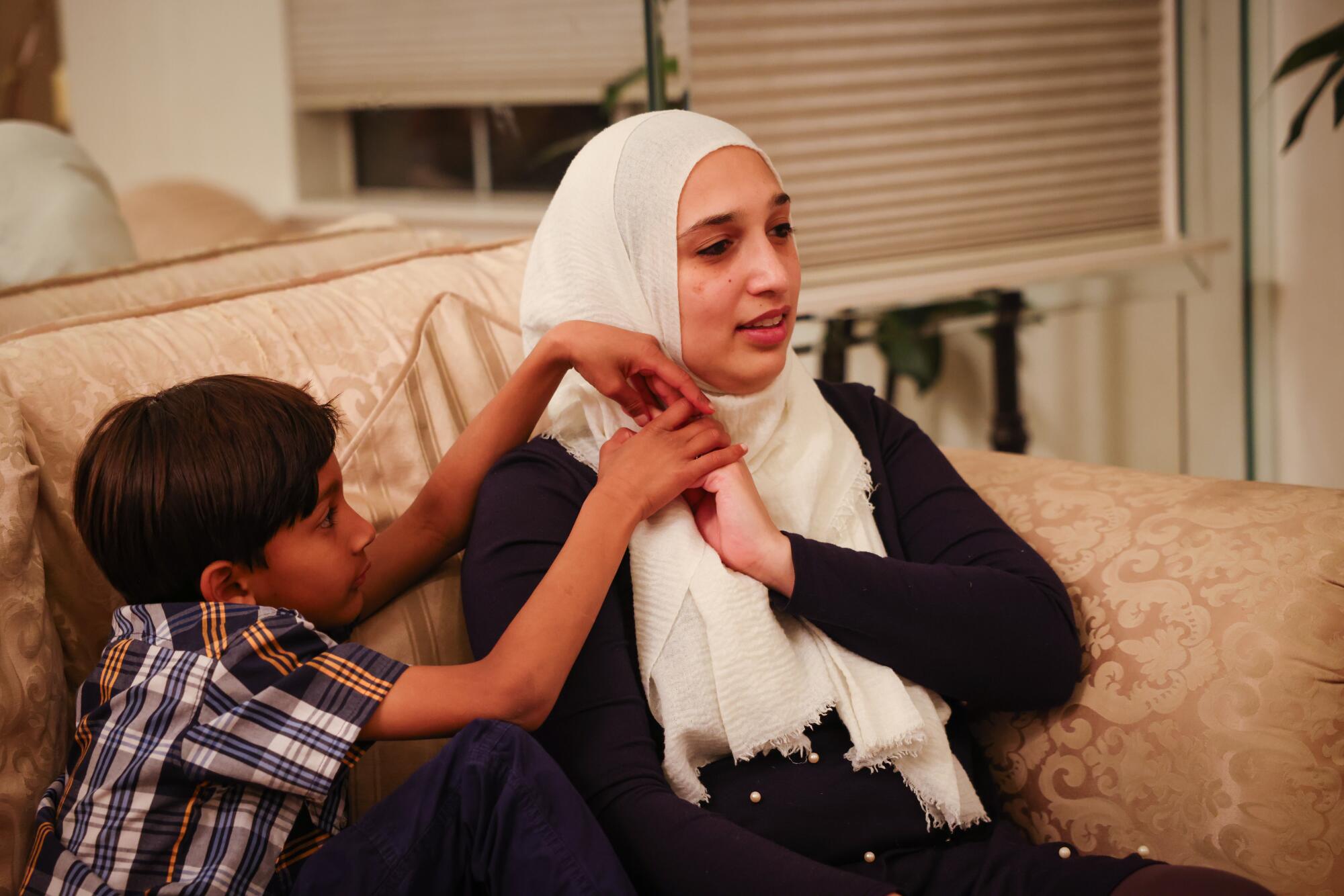
There’s a lot of Christmas decor surrounding the Tustin home of Sara and Sameer Ahmed and their three young children. Lights twinkle in the bushes in their neighbors’ yards and wreaths decorate their front doors. Blue and white light icicles drip from one garage, while a string of ornaments hangs from another. But the Ahmeds’ decorating will come later, when they put up strings of moon and star lights to celebrate Ramadan, a holy month in the Islamic calendar.
Imran, 7, has friends who celebrate Christmas, but he doesn’t think it’s a big deal that his family doesn’t. Instead, he looks forward to Eid al-Fitr, the first day after Ramadan, which he says is kind of like Christmas.
“In the morning, you have to wake up pretty early to do Eid prayers, and then you meet family and get gifts from them and you give to charity and then you go home and get gifts from your family,” he says, surrounded by pillows on a fluffy couch.
His dad, Sameer, whose parents immigrated from India and who grew up in Bakersfield, remembers watching his friends celebrate Christmas and thinking that it all looked like a lot of fun — the reindeer, the presents, the songs that he’d somehow memorized without even trying. Now that he has kids, he wants to make Muslim holidays just as exciting for them.
“It’s hard to replicate Christmas when it’s something the entire society does,” he says. “But we’ve kind of taken it on ourselves, as a lot of parents our generation in the Islamic faith here have, to try to make our holidays really fun.”
While the Ahmeds don’t celebrate Christmas themselves, they do support the celebrations of their friends. They cheered their neighbors on when they won second place in their community’s Christmas decorating contest, and as physicians, they often pick up the Christmas shift at the hospital so their colleagues can be with their families.
“We want them to enjoy it,” Sara says. “And for us, it’s just another day.”
Sparkly lights are part of most holiday memories, and Southern California certainly delivers with both free and paid holiday light shows closing out 2023.
Just don’t tell other kids Santa isn’t real
Amisha Patel and Nisharag Shah, parents of 2-year-old Lily, didn’t feel left out of Christmas celebrations growing up Hindu in the United States. That’s because both their families honored the holiday in their own way.
“I love crafting, and my mom and I would decorate the house every year,” says Amisha, sitting in the family’s bright Miracle Mile apartment. “It was the first house we had in America, and the first time my parents had an opportunity to decorate like that. My mom was really into the whole thing.”
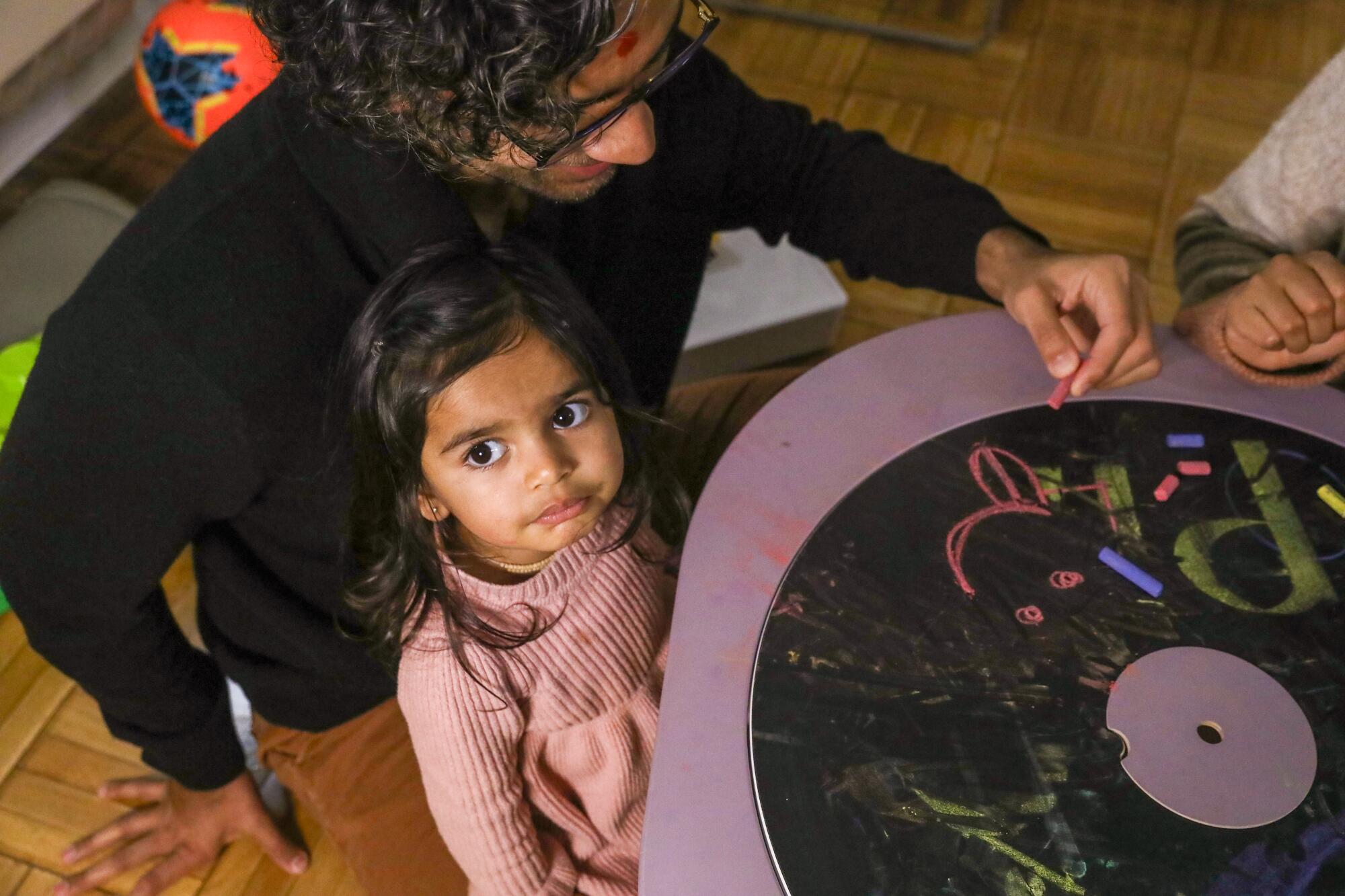
There were icicle lights outside their rural Georgia home, garland on the banister and stockings hanging above the fireplace. But it wasn’t a totally traditional Christmas. They didn’t have a Christmas tree, and while she did receive presents on Dec. 25, Santa Claus wasn’t part of the deal.
“My friends would talk about Santa, but I remember my aunt telling me, ‘Hey, if someone tells you Santa Claus is real, you don’t say anything,’” she says.
Her husband, Nisharag, had a similar experience in his childhood home outside Chicago. His family would string holiday lights around their yard in late October or early November for Diwali, the Hindu festival of lights that welcomes the new year. Then, they left them up for Christmas. He did have a Christmas tree and a few presents to open on Dec. 25.
Looking back on it now, he thinks his parents — who immigrated from India — wanted him and his siblings to feel comfortable in their American home.
“They knew that after winter break, we’d go back to school and all the kids would talk about what gifts they got on Christmas and they didn’t want us to feel left out,” he says. “My mom and dad felt like these are the traditions that exist in the country we live in, so you’ll also get a gift. We didn’t complain about it, obviously.”
Nisharag, Amisha and Lily are heading to India to visit family this Christmas, but last year, they had a little tree in their apartment and bought presents for Lily to open.
“Christmas traditions are service, celebrating each other and quality time with family and friends. Those are universal values.”
— Nisharag Shah
“Christmas traditions are service, celebrating each other and quality time with family and friends,” Nisharag says, adding that his guru Pramukh Swami Maharaj teaches respect for all religions. “Those are universal values.”
For many American Jews, Christmas simply isn’t Christmas without kung pao chicken and afternoon tickets to the latest holiday blockbuster.
Celebrating ‘Jewish Christmas’
In a corner banquette seat at Long Xing Ji Juicy Dumpling in San Gabriel, Greg Nelson and Naama Haviv are reminiscing about the Christmas celebrations of their youth. Greg, who had a Jewish mother and a dad who left the Baptist church, grew up with full Norman Rockwell-style Christmases in his Pacific Palisades home: giant tree, stockings, loads of presents. But Christmas, in his memory, was entirely secular. “I don’t think I realized Jesus was a part of it,” he says.
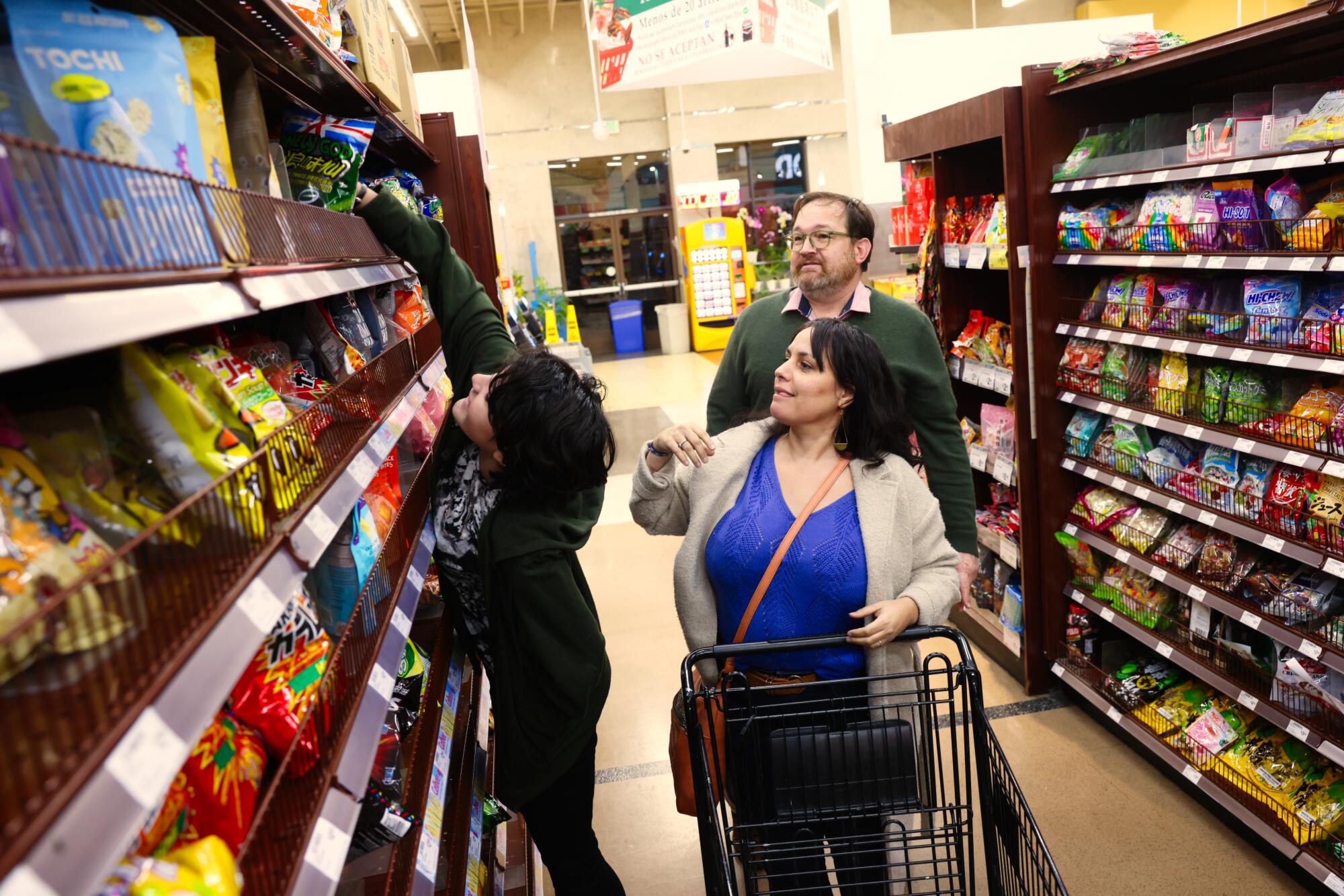
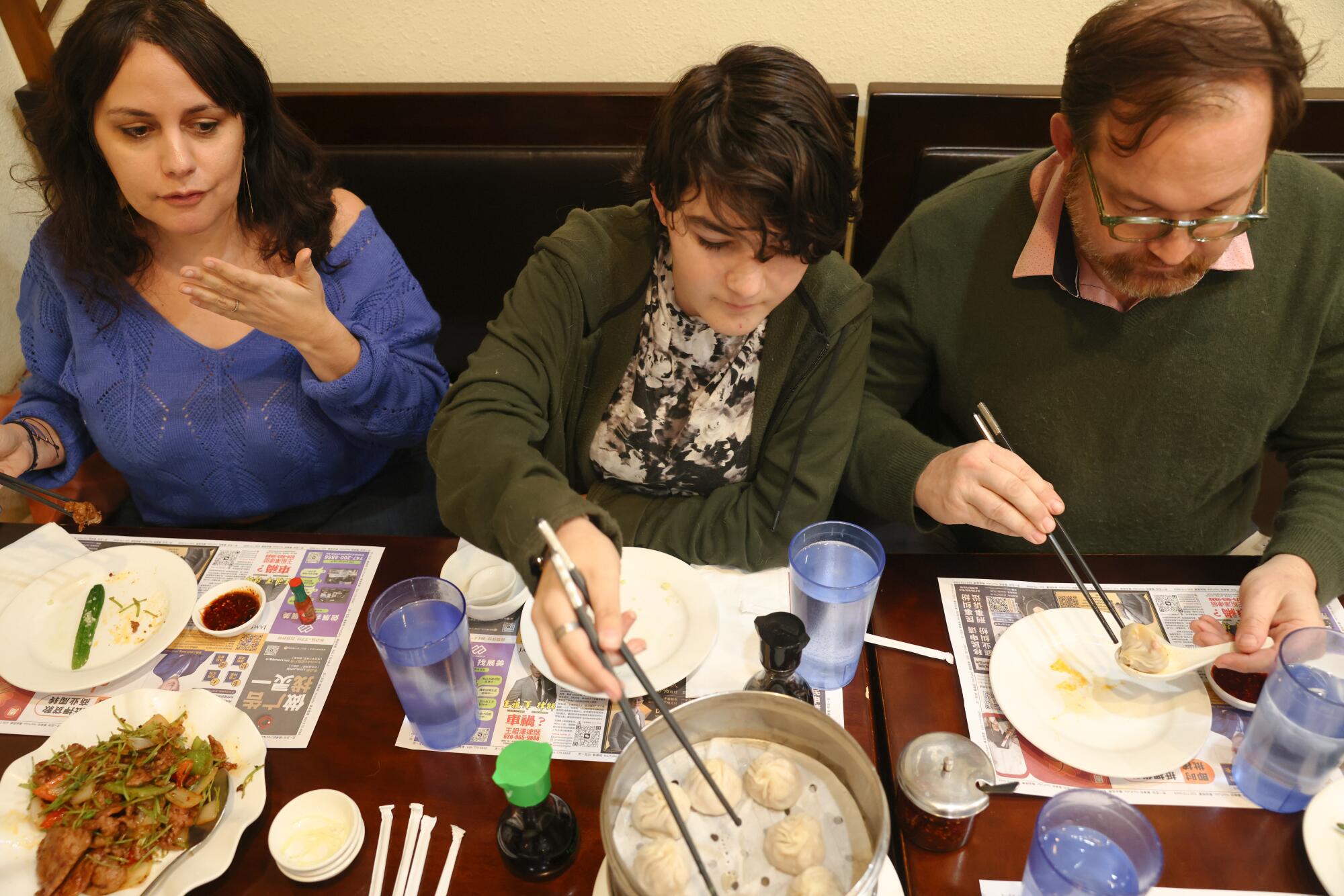
Naama, whose family immigrated from Israel when she was 1½, remembers a childhood of “visiting Christmas.” In elementary school, she spent Christmas at a neighborhood friend’s house in Andover, Mass., where she had to wear her best clothes and be on her best behavior.
Her young self concluded that while Christmas looked great on TV, it was actually very boring. She then moved to California and started going to a Salvadoran friend’s home on Christmas Eve.
“It was the most fun on Earth,” she says. “It was a giant dance party until midnight, then we had to inhale 12 grapes, and then it was a feast and more dancing until dawn.”
Before the two married, they agreed that they wanted to raise their future children Jewish and discussed how they would celebrate the winter holiday season. Greg thought they might put up decorations like blue and white lights. Naama was dead set against it. “They’re called Christmas lights,” she says. “We’re not going to do a thing and pretend it’s for Hanukkah.”
Now, they celebrate what they call “Jewish Christmas” on Dec. 25. Together with their kid, Lee, 14, they go to the movies and then order tons of food at Long Xing Ji Juicy Dumpling, a family favorite. Afterward, they head to the 99 Ranch market in the same shopping complex and fill a cart with crunchy snacks, novelty chips and fluffy sandwich cakes. On the way home, they look for the most opulent Christmas light displays they can find. “I want super-colorful,” Naama says. “The tackier and crazier the better.”
When they’re feeling especially snarky, they’ll remember to bring along a pair of prism glasses that change every point of light into a Jewish star.
Atheist Adventures offers non-believers in Los Angeles and beyond the opportunity to experience wonder and awe in the most inspiring places in the West.
Modeling what mutual respect looks like
Ask 16-year-old Jaden and 12-year-old Mikayla Villanueva if it’s hard not celebrating Christmas and both of them will tell you — not so much.
“As a family, we’ve always talked about not just that we don’t celebrate Christmas but also the reason why,” Jaden says, sitting on an L-shaped couch in their Santa Clarita living room. “So when I went to school, even though most of my classmates celebrated Christmas, I was comfortable with my decision.”
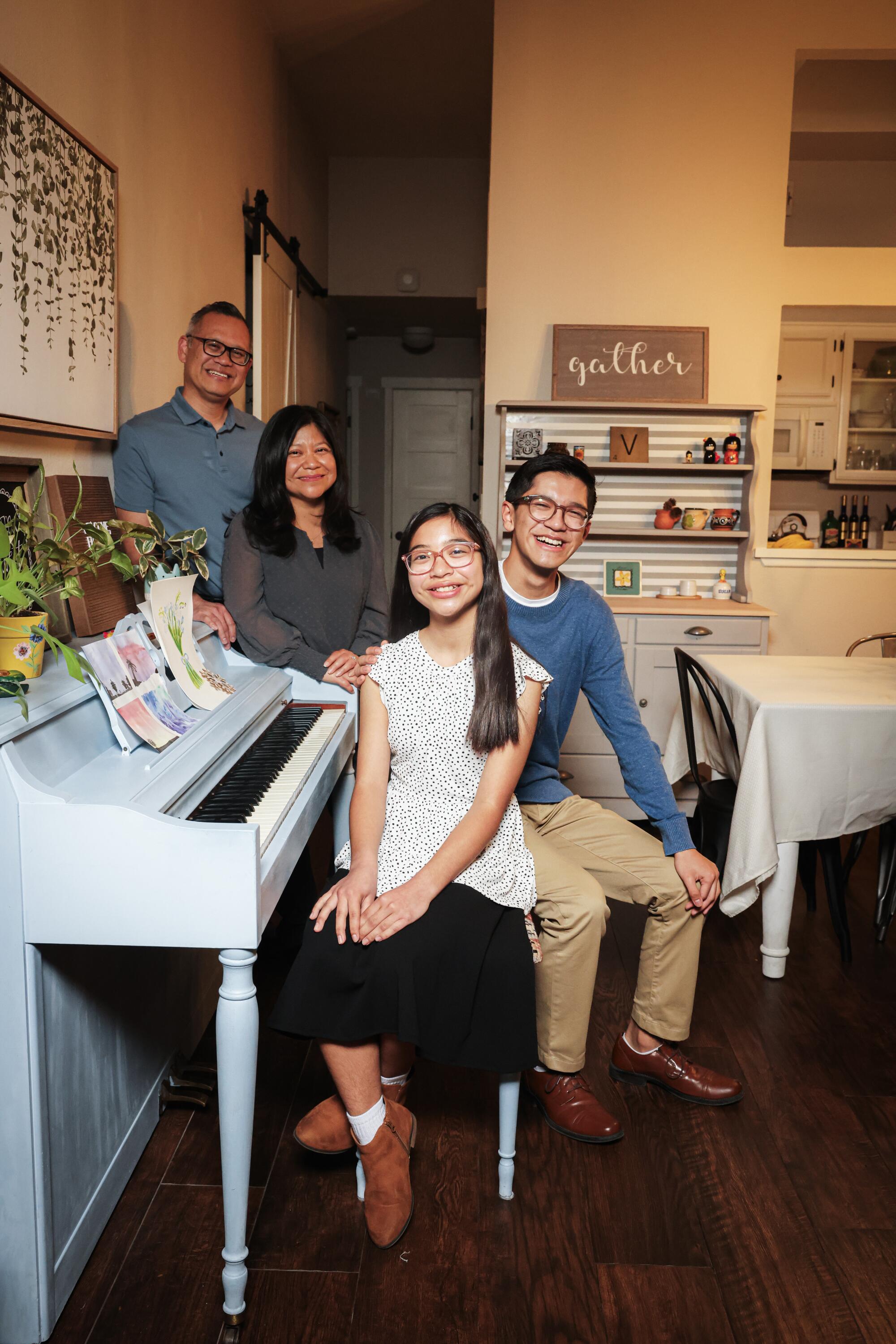
Their dad, Braden, explains that as Jehovah’s Witnesses, the family doesn’t celebrate Christmas because Jesus never asked his followers to celebrate his birthday, and that date is not revealed in the Bible. “The one thing he did ask them to celebrate was the commemoration of his death, so we hold to that,” he says.
Jaden and Mikayla’s teachers have generally been kind and respectful about their religious beliefs. Jaden remembers one year in particular when a teacher chose to swap out the usual holiday craft project and have the whole class do a seasonal project instead — making snowmen out of socks and rice.
“That was a good feeling as a kid, knowing that your teacher cared,” Jaden says. “I was with the whole class so I didn’t feel excluded. I know that took effort, and I’m so grateful for that.”
When Jaden and Mikayla were younger, their parents would meet briefly with their teachers before school started to tell them that they were Jehovah’s Witnesses and that they don’t observe holidays and birthdays.
“At the end of the day, we want this to be their choice and not something we are imposing on them.”
— Lily Villanueva
“We let them know that we would be more than happy to work with them to create alternative assignments for the kids,” says their mother, Lily. “It was important for us to be respectful of other people’s decision to celebrate the holiday, and also have that reciprocated — that there was respect for our beliefs.”
As the kids got older, Braden and Lily encouraged them to have those conversations with teachers on their own. “At the end of the day, we want this to be their choice and not something we are imposing on them,” Lily says.
Mikayla says the time her family spends talking together about their beliefs makes it easier for her to explain her perspective to others. “It helps me to keep going,” she says. “It helps me a lot.”
More to Read
Sign up for The Wild
We’ll help you find the best places to hike, bike and run, as well as the perfect silent spots for meditation and yoga.
You may occasionally receive promotional content from the Los Angeles Times.
